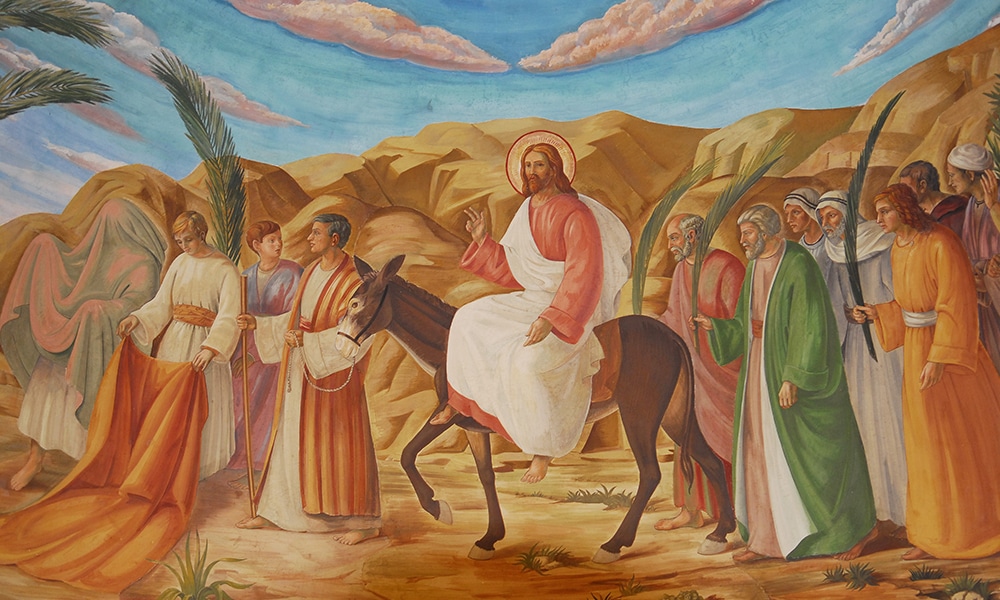
We gather with palms in hand to praise the coming of the great king. He enters Jerusalem on a donkey, with cries of praise from the crowds. The Pharisees murmur against Jesus, but he warns, “I tell you, if they keep silent, the stones will cry out” (Lk 19:40).
To the reader of this text, the ascension of Christ to the throne of David seems inevitable. The crowds are prepared to fete him as king on this most holy feast of Passover.
Liturgically, we are that crowd. We are those gathered with palm branches in hand, singing out “Hosanna!”
But what kind of crowd are we? For the very same crowd that celebrated Jesus’ entrance into Jerusalem with pomp will also turn against him.
| Palm Sunday of The Lord’s Passion – April 14, 2019 |
|---|
|
LK 19:28-40
IS 50:4-7 PS 22:8-9, 17-18, 19-20, 23-24 PHIL 2:6-11 LK 22:14–23:56 OR LK 23:1-49 |
In Luke’s account of Christ’s passion, we hear about the disciples having one last argument about who is greatest in the Kingdom. We hear Peter’s voice stand out among the crowd, promising a fidelity that he cannot maintain. We see the disciples fall asleep, unable to stay awake for but an hour. We see Judas condemn Christ with a kiss. Judas doesn’t come alone but with a crowd prepared to arrest Christ.
We are privy to a council of elders who question Jesus. They demand from him proof of his identity. The crowd brings charges against Christ.
It is the crowd that demands the crucifixion of Jesus above that of Barabbas. It is the crowd that gathers not just to see Jesus crucified and tortured by a foreign state. The bloodlust of the crowd has come to see the death of the two thieves. It is the crowd that scatters when Jesus dies, except for a few of the faithful women and Joseph of Arimathea.
How does a crowd willing to crown Jesus as king turn so quickly to participate in a festival of his death?
When we Christians profess that Jesus has come to save the world from sin, the bloodlust of the crowd is what we mean. We don’t just mean our propensity to tell a white lie. We mean that there is something so deeply disordered about the human condition that we are capable of doing the worst to one another, even to the Word made flesh.
Jesus takes upon himself the darkness of the world, the darkness of an age in which crowds delight in the death of fellow human beings.
This world, dear friends, has been conquered through Jesus’ passion, death and resurrection. It can’t win. But, it is still trying.
It tries when we ignore the dignity of the human person, reducing the unborn and migrant alike to disposable objects. It tries when leaders within the Church, those who are descendants of the apostles, are more concerned about the privilege their position affords them than conforming themselves to the Word made flesh. It tries when we find ourselves turning on each other in our parishes, creating disharmony where communion should reign.
The warning of Palm Sunday is that it’s easy for us to move from praise to blame. Even faithful Catholics can fall into the bitter fruits of sin.
The gift of Easter, as we will see, is that we also can move from blame to redemption, from death to new life.
Timothy P. O’Malley, Ph.D., is managing director of the McGrath Institute for Church Life.

